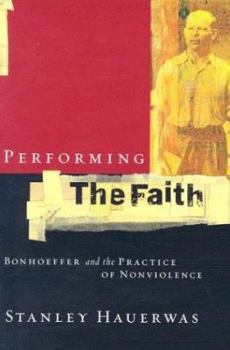Performing the Faith: Bonhoeffer and the Practice of Nonviolence
Select Format
Select Condition 
Book Overview
""Folksy, eclectic, disarmingly humble, and astonishingly wide-ranging, Hauerwas offers us a provocative reading of Bonhoeffer that, not surprisingly, assimilates him closely to John Howard Yoder. At... This description may be from another edition of this product.
Format:Paperback
Language:English
ISBN:1587430762
ISBN13:9781587430763
Release Date:April 2004
Publisher:Brazos Press
Length:252 Pages
Weight:0.90 lbs.
Dimensions:0.7" x 6.3" x 9.0"
Customer Reviews
2 ratings
The Joy of Stumbling Upon Hauerwas
Published by Thriftbooks.com User , 18 years ago
Performing the Faith is the first book I have read of Stanley Hauerwas and I feel as though I have met a new friend. I am particularly pleased to have stumbled upon him because, while I have found many excellent biographers, historians, philosophers, scientists, social commentators, etc. to read, Hauerwas is the first contemporary intellectual evangelical Christian that has captured my attention (perhaps I have not looked very hard). Hauerwas is candid and relevant. He seems to love the give and take of a good debate. He concedes ground when appropriate, but holds his own with wit and good humor. In this collection of essays, Hauerwas tests and expands his views against (and with) Augustine, Aquinas, Wittgenstein, Yoder, Millbank, Stout, Rawls, Barth and a host of others, including, of course, Bonhoeffer. Though Bonhoeffer is named in the book's subtitle, the heart of the book is found in the essays in part two: Truthful Performances. "What is overlooked by both subjective and objective accounts of faith is the sense in which Christian existence is first and foremost and activity - a performance, if you will." Hauerwas, with James Fodor, effectively use the analogy of rhetoric, musical performance and improvisation to illuminate "the general art of living well under God." In the next essay, Hauerwas uses Wittgenstein's work "to help rediscover the frightening beauty of the particular," to which the Christian is called to be a faithful witness. This means engaging in "life-forming practices . . . without seeking false comforts in a world of contingency." Particularly good are Hauerwas's essays on September 11, 2001. Hauerwas is uncomfortable with the fact that "we get to call the violently secured order that makes our lives possible - peace. Only terrorists refuse to accept the peace our order names." His discomfort is exacerbated because "we know it is possible to love our enemies. Otherwise why would Christ in the Sermon on the Mount ask that we so love?" He asks, "Are we to make Christ a liar? If we do not think it possible to love our enemies, then we should plainly say Jesus is not the Messiah." What is the truth Christians are called to bring to the table? What is the Christian witness to be in a world of violence? Hauerwas doesn't offer up simplistic answers but he does concede "Yoder [in his book The Politics of Jesus] convinced me that if there is anything to this Christian `stuff' it must surely involve the conviction that the Son would rather die on the cross than have the world to be redeemed by violence." I recommend Performing the Faith to anyone who is interesting in thoughtfully considering what it means to be a Christian in the context of our new-world-at-perpetual-war-order. I look forward to reading more of Hauerwas.
Living the Christian Faith (and answering his critics)
Published by Thriftbooks.com User , 20 years ago
As a person who has read a lot of Hauerwas's work, the themes in this book did not surprise me at all. What did surprised me was the responsive feel that many of the essays had. In this book, it seems like Hauerwas was very aware of the criticisms against his work and feels compelled to respond to them. Hauerwas has always been invested in Theological disputes. However, in most of his older work, he was the one who served as a critic of another's thought. Lately, though, much of his work has been defending his own ideas (which he would probably claim are not his own, but a faithful expression of the Christian faith). This book is no exception. Hauerwas has been criticized for being anti-modern, anti-liberal democracy, and sectarian. In Performing the Faith, he seems to be saying "yeah, but so what" to the first two. He is against modernity and wants to move away from foundational ways of thinking becasue he sees it as harmful to the faith. He is against liberal democracy, particularly in its most typical recent defenses, because it replaces the Christian story with a new non-story (the story that you don't need a story). It seems, though, that it is the sectarian charge that he takes most offense to. In this book particularly, Hauerwas seeks to make clear that the distinction he draws between the church and the world is "permeable" and for the good of the world. You find a desire for the church's witness to the world to be such that the world knows it is the world and desires to be the church. His emphasis on Bonhoeffer is important because Bonhoeffer experienced the tension between the church and the world in unique and compelling ways. Buyer beware: this is a book of Hauerwas essays not a book on Bonhoeffer. Only the first section deals with Bonhoeffer. Not surprisingly, Hauerwas's read of Bonhoeffer makes Bonhoeffer sound a lot like Hauerwas (and Yoder). That does not necessarily make it wrong, but it is worth noting. I believe this is a wonderful defense of the ideas Hauerwas has fought so long for.






